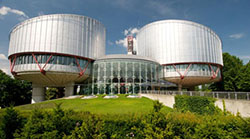In the course of an on-line discussion about Brexit yesterday a hard-line leaver told me he wanted, among other things, “a right to deport people detrimental to the UK without the ECJ overriding our court’s decisions.” I pointed out to him that the ECJ does not do that. The body that does is the ECHR (The European Court of Human Rights) which is separate from the EU and which Brexit does not impact. This confusion between the two courts is endemic among Brexiters and needs to be properly understood.
The ECJ (European Court of Justice) exists to enforce the various directives issued by the EU in pursuit of its competition policies.
For the most part these concern things involving workers’ rights, consumers’ rights, safety and environmental issues and energy conservation. Member states are supposed to incorporate the substance of such directives into their own legislation. If they fail to do so that gives their businesses a competitive advantage over businesses in those states that have adopted the particular directive. The disadvantaged state can take a case to the court which will investigate and make a judgement which could lead to the offending member state being penalised.
If/when the UK is no longer a member state it will be able to repeal those laws introduced in response to directives that it deems to be restrictive of free and fair trade. The ECJ will no longer have jurisdiction.
Of course, any subsequent trade agreement that we negotiate with the EU, or with third countries, will contain rules and regulations which will need to arbitrated upon by some body not unlike the ECJ.
The WTO has a “Dispute Settlement Body” which operates in much the same way to ensure that agreements entered into are respected by all parties.
“It monitors the implementation of the rulings and recommendations, and has the power to authorize retaliation when a country does not comply with a ruling.” (Quoted verbatim from https://www.wto.org/ENGLISH/thewto_e/whatis_e/tif_e/disp1_e.htm)
So, post Brexit, the UK will not be free to “control its own laws” when it comes to matters of international trade.
 Let’s turn now to the ECHR, the body that enforces the European Convention on Human Rights entered into by all 47 members of the Council of Europe. Originally drafted in 1950 (when there were only 10 members of the Council), it is based on the United Nations Universal Declaration of Human Rights.
Let’s turn now to the ECHR, the body that enforces the European Convention on Human Rights entered into by all 47 members of the Council of Europe. Originally drafted in 1950 (when there were only 10 members of the Council), it is based on the United Nations Universal Declaration of Human Rights.
Article 3 of the convention prohibits torture.
It is this provision that has lead to the difficulties encountered by the UK government in seeking the deportation of certain individuals who claim that the country to which they were to be deported was governed by a regime in which torture was permitted.
The Convention was enshrined into UK law by the 1998 Human Rights Act. Since then the Conservative Party has discussed the repeal and/or replacement of that act. As this article indicates, post Brexit any “loss of human rights protection will be mitigated as long as the UK continues to be a member of the European Convention on Human Rights.”
Brexit alone will not remove this particular impediment to deportations.
A new Bill of Rights could. Such a bill could have been enacted pre-Brexit and may well be enacted post Brexit, although only if the Conservatives are able to increase their majority in a future general election.
It is the confusion in the minds of many UK citizens over this, and other aspects of EU membership, that convinces me the 2016 referendum was flawed and needs to be revisited, with the option of withdrawing the Article 50 application to leave.

Very interesting article, Frank.
LikeLiked by 1 person
Thanks, Roberta
LikeLiked by 1 person
Although I do not live in Europe, I’m thankful to you for posting this very informative article. There is so much we don’t know about, or understand, when it comes to international relations, and trade.
LikeLiked by 1 person
Thanks for explaining the difference, Frank. I’ve been following developments of the Brexit negotiations and, as you have concluded, have come to realize that the British people had a poor understanding of what Brexit would entail.
LikeLiked by 2 people
The whole leave campaign was based on meaningless slogans and ignorance of the kind you describe. I don’t think anyone is better informed now than they were in June 2016, and there is going to be a very rude awakening for many when they finally start to realise – too late – the consequences of leaving the EU.
LikeLiked by 2 people
I fear you are right, Clive. Listening to vox pops on BBC news it’s clear that most people haven’t a clue what is being done in their name. And then the ideologues pop up telling us it will all turn out fine. I so hope they are right and I am wrong.
LikeLiked by 2 people
The truth is that no one knows how it will turn out. Even Rees-Mogg has admitted that it may be fifty years before we’ll see the full ‘benefits’ of leaving. I don’t have that long! It just feels like a giant step into the unknown, giving up so much for those unspecified ‘benefits.’ The only sensible course of action is to admit that is a huge mistake and stay in the EU, but when were politicians ever led by common sense?
LikeLiked by 1 person
After I wrote my first reply to you I opened Facebook and saw a leave MP complaining that May’s deal means we will no longer have MEPs !!?? What planet are these people from?
LikeLike